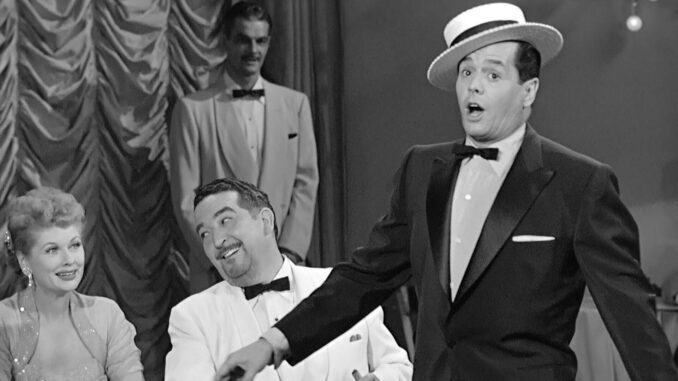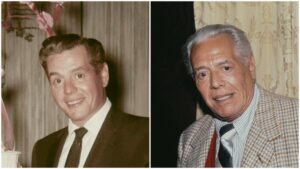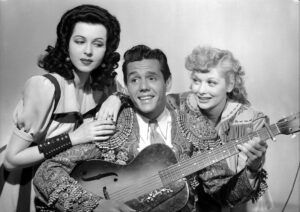
When you think of I Love Lucy, the first thing that comes to mind is Lucille Ball, right? But let’s not forget the man who stood beside her both on-screen and off: Desi Arnaz. Known affectionately as “The Prince of Cuba,” Arnaz wasn’t just Lucille’s husband; he was a visionary who played a monumental role in shaping the history of television. Let’s dive deep into the life of Desi Arnaz, as remembered by biographers, and explore why his legacy lives on today.
Who Was Desi Arnaz?
Desi Arnaz was much more than just Ricky Ricardo on I Love Lucy. Born in Santiago de Cuba in 1917, Arnaz had a colorful early life filled with riches, revolutions, and even exile. After fleeing Cuba, Arnaz started from scratch in America, using his charm and talent to break into Hollywood.
The Cuban Prince
Arnaz earned the nickname “The Prince of Cuba” due to his family’s wealth and political influence back in Cuba. His father was the mayor of Santiago, and the family lived a life of luxury before political turmoil forced them to leave the island. Despite losing everything, Arnaz’s charismatic and determined nature helped him rebuild his life and career in the United States.
Early Life Struggles
Starting over wasn’t easy. Desi had to find odd jobs before getting his big break in music. His talent as a musician and his distinct Cuban sound got him noticed, leading him to Broadway and, eventually, Hollywood. One of his early breakthroughs was introducing the conga line to American audiences—a small hint of how Arnaz would later change entertainment forever.
Desi Arnaz and Lucille Ball: A Power Couple

The magic of I Love Lucy wasn’t just confined to the screen. Desi Arnaz and Lucille Ball’s love story was a real-life whirlwind romance that led to one of the most iconic TV shows in history. But behind the laughter and on-screen chemistry was a complicated marriage filled with highs and lows.
Meeting and Falling in Love
Desi Arnaz and Lucille Ball met on the set of Too Many Girls, and it was love at first sight. Despite their cultural differences and their 6-year age gap, the two married in 1940. Their relationship became the foundation for I Love Lucy, and the show reflected much of their real-life love and challenges.
Turning Real-Life Marriage Into TV Gold
Initially, CBS didn’t want Desi Arnaz to play Lucy’s husband on I Love Lucy, thinking that American audiences wouldn’t accept a Cuban man as a lead on television. But Arnaz and Ball fought for it. They even toured the country with a live act to prove their chemistry. The result? TV history.
The Business Mind Behind the Icon

While Lucille Ball was the face of I Love Lucy, Desi Arnaz was the brains behind it. His contributions went far beyond acting. Arnaz co-founded Desilu Productions, which became one of the most influential studios in television history.
Pioneering Television Production
Desi Arnaz revolutionized television production. Instead of filming the show live, Arnaz insisted on using multiple cameras and filming in front of a live audience. This decision changed the way sitcoms were produced and is still the standard today.
Inventing the Rerun
Yes, you can thank Desi Arnaz for reruns! To accommodate Lucy’s pregnancy, Arnaz came up with the idea of rerunning older episodes. This not only kept audiences engaged but also opened a new revenue stream for television shows. Today, reruns are a billion-dollar industry.
Desilu Productions: A Legacy
Desilu Productions didn’t just stop at I Love Lucy. Under Arnaz’s leadership, the studio went on to produce legendary shows like Star Trek and Mission: Impossible. His business acumen allowed him to foresee the potential in these groundbreaking shows.
The Rise of Desilu Studios
At its peak, Desilu was the largest independent TV production company in the U.S. Arnaz’s ability to combine business savvy with entertainment intuition was unmatched. He saw potential in scripts and ideas that others dismissed, which turned into massive successes.
Selling the Studio
In 1962, Arnaz sold Desilu Productions to CBS, a decision that marked the end of an era. However, his legacy in television production continued to influence the industry long after.
The Personal Struggles of Desi Arnaz
Despite all his success, Desi Arnaz faced numerous personal challenges. His marriage to Lucille Ball, which began with such promise, eventually crumbled under the weight of his drinking and infidelity.
The End of a Marriage
After 20 years of marriage, Ball and Arnaz divorced in 1960. Their split shocked the world, but they remained friends and continued to co-parent their children, Lucie and Desi Jr. While Arnaz’s personal life may have faltered, his professional legacy remained intact.
Overcoming Addictions
In his later years, Arnaz struggled with alcoholism, but he eventually sought treatment. His battles with addiction were a testament to his resilience, showing that even the most successful figures face personal demons.
Remembering ‘The Prince of Cuba’
Desi Arnaz passed away in 1986, but his legacy lives on. As biographers have noted, Arnaz’s contribution to the television industry and his role in I Love Lucy shaped the future of entertainment. His pioneering ideas are still felt today, making him a true legend in Hollywood.
Arnaz’s Impact on Cuban-Americans
Arnaz’s success opened doors for other Cuban-Americans in entertainment. He was one of the first Latino actors to be celebrated in mainstream American culture, paving the way for future generations of actors, musicians, and producers.
A Lasting Legacy
Arnaz’s legacy is not just in his work but also in how he broke barriers for Latinos in the entertainment industry. His life story is a testament to the American Dream, showing how perseverance and innovation can lead to success.
Conclusion: Desi Arnaz—A Visionary, Pioneer, and Legend
Desi Arnaz wasn’t just the charming Cuban bandleader from I Love Lucy. He was a trailblazer, a creative genius, and a business mastermind who changed the television landscape forever. Whether you’re watching a sitcom filmed with multiple cameras or catching a rerun of your favorite show, you’re seeing Arnaz’s fingerprints on modern entertainment. His story, as remembered by biographers, reminds us that sometimes the people behind the scenes are the ones who make the biggest impact.